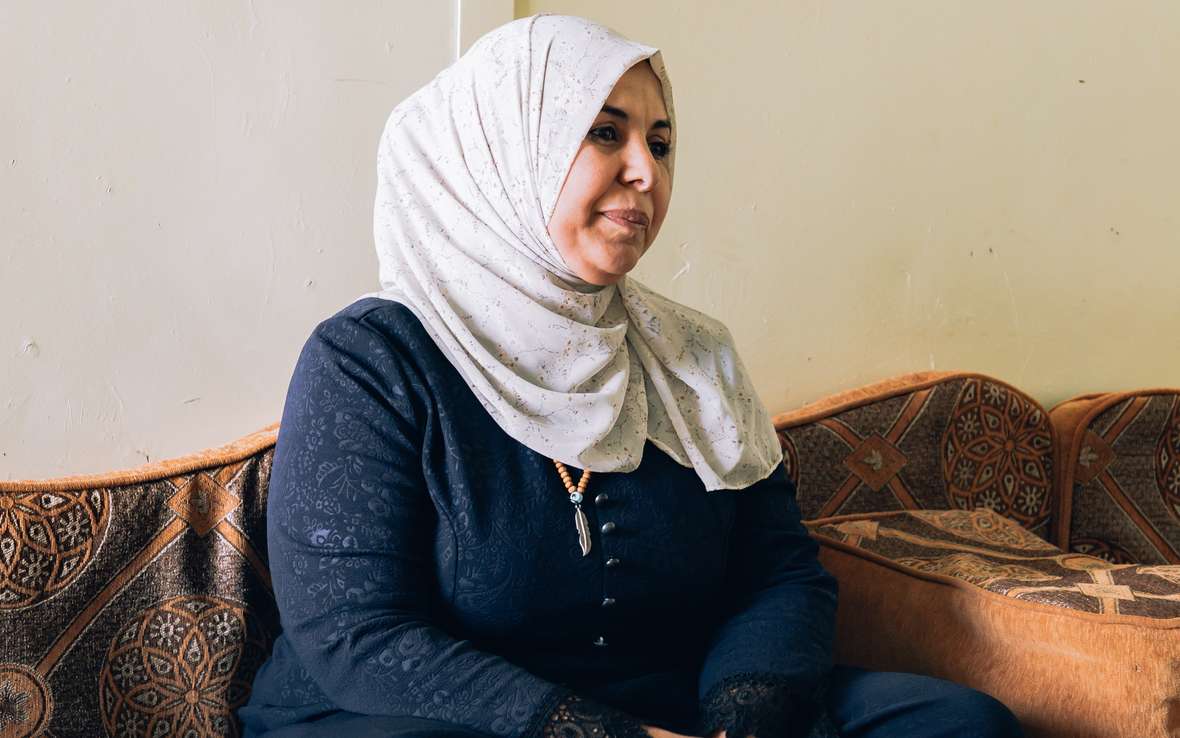In Jordan, a decent job–even a temporary one–makes a difference for refugees
When Majd’s brother needed help, there was only one family member he could count on.
“My brother wanted to get married,” said Majd, a middle-aged refugee and single mother. “He asked me for money and I couldn’t say no. I had around US $900 set aside and I gave it to him.”
“No one else from the family could help him but me,” she said.
She was in a position to help her brother thanks to her job working at a recycling plant at the Za’atari refugee camp. Established 10 years ago this month, it’s the world’s largest camp for Syrian refugees, with a population of about 80,000.
Life in the camp
People in Za’atari battle harsh living conditions, shrinking opportunities, and uncertainty about the future. Located 80 kilometers (50 miles) northeast of Jordan’s capital Amman, the camp is in an arid area where weather conditions are extreme and tin caravans (mobile homes) can barely hold against the frequent dust storms.
Oxfam is one of the largest providers of income opportunities in Za’atari refugee camp, and is responsible for all waste collection. The recycling initiative Majd mentioned is staffed by refugees and jobs vary from supervisors, to waste sorters, and waste collectors. Oxfam also employs engagement officers who act as a bridge between the projects and the people.
Oxfam currently provides around 850 temporary income opportunities, and over the past two years more than 10,000 people benefited from these opportunities. Through this work, refugees have diverted around 4 million kilograms (about 8,82 million pounds) of waste from Jordan’s landfills.
Cash-for-work contracts range from one month to one year, mainly to ensure the largest number of people can benefit. Many struggle to make ends meet in between periods of employment. More than 70 percent of refugees in the camp are in debt. Recent reports stated that prices in the camp rose by 22 percent this year.
Living "day by day"

The knock on the door echoes around the tin caravan, where a child cries in the modest living room. The wind whistles through the cracks in the doors and windows.
“Hey! Someone check on the baby,” shouted Mayada, 40. Mayada has lived in Za’atari refugee camp for almost a decade, after fleeing war in Syria and leaving behind a home nestled in olive groves that belonged to her uncle.
Mayada worked as a nursing assistant before the war. Now she lives with her two daughters and a granddaughter who was recently abandoned by her father and whose crying now fills the caravan.
Mayada is currently unemployed and trying to survive on assistance from UN High Commission for Refugees, amounting to about $162 per month for the whole family. “This is barely enough for the basics - rice, sugar, tea, and bread… It doesn’t pay for clothes, heating or transport,” she says.
Until recently, Mayada had a job with Oxfam. “I worked with Oxfam with the community engagement team. I used to make $338 [per month], which helped me pay my debt to the grocer and fix the caravan a bit.”
“Those who are employed live day by day, and those who are not need to sell their food coupons to afford other necessities,” says Mayada.
Those waiting their turn to work at the recycling plant have few options. After the pandemic hit, work outside of the camp dropped significantly, and new regulations made it more expensive for refugees to secure work permits. In 2017, more than 7,000 permits were granted to refugees, but so far in 2022, only 176 permits have been renewed.
This is why cash-for-work programs by Oxfam and other agencies are so valuable. According to an Oxfam survey conducted in 2019, 86 percent of participants felt the programs provide a safe environment and give women equal access. Refugees who took part in cash-for-work programs have shown significant improvement in self-esteem compared to those who did not.
An uncertain future
Nickie Monga, country director for Oxfam in Jordan, says cash-for-work programs have provided much-needed opportunities for refugees to earn income. More than 60 percent of refugees live below the international poverty line in Jordan, surviving on less than $5.50 a day.
“Jordan has a unique history of welcoming refugees, and it has been a generous host to more than 1 million Syrians,” said Monga. “The international community has a responsibility to keep supporting the refugee response in Jordan to share this burden and ensure humanitarian agencies can ensure vulnerable families receive the support they need.”
While programs such as cash-for-work provide temporary lifelines to refugees, long-term solutions are desperately needed. “Half of the refugees in Za’atari camp are children,” said Monga. “Ten years into the crisis, it is more urgent than ever to find solutions to secure their futures.”
Majd has been managing a team at the recycling center for the past year and she uses the income to support her daughter, parents, and siblings. Though she holds the highest cash-for-work position Oxfam offers, she remains determined to achieve more and to provide a good future for her daughter.
“We’ve been here for 10 years, but it still doesn’t feel stable,” she said. “I don’t feel that I have job security, I never know when I’ll be let go. I need work, but I feel deprived of opportunities because I’m in the camp. I feel stuck,” Majd says.
For Mayada, work offers benefits beyond income. “Work gives my life meaning even if I am tired,” she says. “I like to know people better and help them. Because of my work, I now know the problems of each house and the people trust me.”
But she shares feelings of uncertainty with Majd. What will future bring, Mayada wonders: “I think about this question at night, and I never find an answer,” she says, “but I think I can bear it.”
